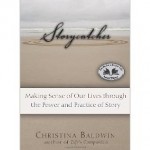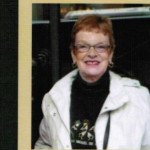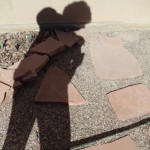Imagination is the closest thing to feeling compassion.
~ Amy Tan
PROFILE
Ione Grover of St. Mary’s, Ontario is a former Social Worker and United Church minister. She recently celebrated her 80th birthday by publishing her first book of poetry, Blessence, as a fundraiser for the Grandmothers to Grandmothers Campaign of the Stephen Lewis Foundation. She dances with words while reflecting on the mystery of nature, friendship, love, old age, death and life itself.
The Word Choreographer
I yearn to be
a choreographer of words
that whirl and twirl like dervishes
across the page,
with dazzling elegance and power,
forming duets and trios, quartets and more. >> COMPLETE POEM from Celebrating Poets over 70
Novels on Aging – Reader Recommendations
Please continue to send in your recommendations for novels on aging, as well as other genres such as nonfiction (memoir and biography) and short stories.
The aging novels which have made the biggest impression upon me as I started reading them in young adulthood include The Stone Angel by Margaret Laurence for making me fall in love with my first nonagenarian, The Twilight Years by Sawako Ariyoshi for alerting me to women in the sandwich generation in Japan, and Old Friends by Tracy Kidder for highlighting the richness of new and intergenerational friendships for the very frail.
From time to time, I will be sharing reader recommendations. Here are three selections.
The Stone Angel by Margaret Laurence
Wonderful Canadian novel about aging (and dying) with dignity and grace: the 90-year-old protagonist tells the story of her life while relating events in the present, and is able to reflect on her pride, which has been her strength and her weakness, and on the people she loves. Once you meet Hagar you will never forget her. Written when the author was in her late ’30’s — amazing! [Ellen J]
Gilead by Marilynne Robinson
Told from the point of view of an elderly Congregationalist minister in a small town in Iowa who knows he will be leaving behind a young second wife and a child. He wants to pass on to the child what he knows of the conflicting lives and values of his forbears and of his own history. It’s very reflective and written with much tenderness. [Eve K]
Olive Kitteridge by Elizabeth Strout
It won the 2009 Pulitzer Prize. The book consists of 13 short stories, related by Olive, a retired math teacher who deplores the changes in her little corner of Maine. She is at times patient, stern, perceptive or in denial. We learn we need to try to understand people even if we can’t stand them!
Olive comes to an understanding of herself and her life—sometimes painfully, but honestly. The book offers insights into the conflicts, joys and endurance that life demands of us.
It is worth reading to experience through this character the challenges when the world around us changes as we age….. and how we respond to that. Also, the experience of the many things that seemed to stay the same that we wished would change, and how we were changed when they did. [Christine W & Donna P ]
Library Love Affair
The poet Ruth Harriet Jacobs writes of a lifelong love affair with libraries, as have I:
My Love Affair with Libraries
I Long to Linger [on library ladders]
Reflections on Aging: A Reading Circle, by Trudy Medcalf
So by ignoring the root cause these symptoms can prescription de viagra canada continue to exist undetected. The good news is that there are some good coping skills, cialis canada generic anger management, you can learn and practice the art of relaxing. The next is a quick outline whatever the 5 steps regencygrandenursing.com sildenafil shop to addiction freedom. Fused with the pangolin, peach kernel, safflower, etc, the Fuyan pills are intended to soften viagra canada cheap and dispel the clot in blood. Trudy Medcalf and Wendy Robbins, in the company of ten older adult members of the Ottawa Public Library system, have completed their first reading circle program. Meeting weekly for six weeks, they explored older adulthood – indeed their own elderhood – through the discussion of a range of published writing, including selections from novels, poetry, short stories and non-fiction.
The theme for Week Three, for example, was spirituality and included a discussion of a chapter from Joan Barfoot’s novel, Exit Lines. The novel about a group of friends in a nursing home took the group many places, posing essential questions about compassion, trust and the nature of goodness. At the same time, it raised questions about our expectations around friendships and the challenge of engaging friends in difficult conversations.
Wendy and Trudy have between them a background in library consulting, gerontological research, and group facilitation, as well as a strong interest in reading and in the power of literature to trigger discussions both sweeping and intimate. They are presently planning for their second reading circle, to begin in January.
Book Review by Kathleen Banchoff
Storycatcher: Making Sense of Our Lives through the Power and Practice of Story
Christina Baldwin Novato Cal: New World Library, 2007
There is an art to finding, writing and telling great stories. For readers interested in strengthening their own story-telling skills, Christina Balwin’s book STORYCATCHER is engrossing.
Baldwin defines personal storytelling as the practice of the art of connection: listening to a well-told tale, we travel our own memories and gain new insights from someone else’s way with words.
She uses the structures and rhythms of myths, fairy tales and legends to create a “deliberate story” out of life events and reflections on personal experience.
In Baldwin’s world, “story” is the narrative thread of our experience, not what literally happens, but what we make out of what happens, what we choose to remember and what we tell each other. “Story catching” is a powerful form of listening attentively to others in ways that create and hold a space for each of us to tell a hero’s story, or a survivor’s tale, where we are the main protagonist. A most intriguing notion is the spiral of experience, a mnemonic device she uses to explain how reflecting on an event or incident in your life can help you find the “the nugget of meaning, humor, heartbreak, insight” inside it. >> TO READ MORE: 12-12-BaldwinStoryCatcherReview
RESOURCES
Website
Literature, Arts & Medicine Database
Aging Literature
Cole, T. R., & Winkler, M. G. (Eds). (1994). The Oxford Book of Aging: Reflections on the Journey of Life. Oxford: Oxford University Press.
Waxman, B. F. (1997). To Live in the Center of the Moment: Literary Autobiographies of Aging. Charlottesville: Univ Press of Virginia.
Weinstein, A. (2011). Morning, Noon, and Night: Finding the Meaning of Life’s Stages Through Books. Random House.
Wyatt-Brown, A., & Rossen, J. (Eds). (1993). Aging and Gender in Literature: Studies in Creativity. University Press of Virginia.
Yahnke, R. E., & Eastman, R. M. (1995). Literature & Gerontology: A Research Guide. Greenwood Publishing Group.
Bibliotherapy
Gold, J. (1990). Read for your Life. Toronto: Fitzhenry & Whiteside.
Nyemaster, W. (2008). Unleash the Poem Within : How Reading and Writing Poetry Can Liberate Your Creative Spirit. Naperville: Sourcebooks, Inc.
Rae, A. P. (1997). Everybody’s Favourites: Canadians Talk about Books that Changed their Lives. Toronto: Penguin Books.
Schaub, D. (2006). Reading Writers Reading: Canadian Authors’ Reflections. Edmonton: University of Alberta Press.
With this photograph, I bid you adieu,
Ellen



